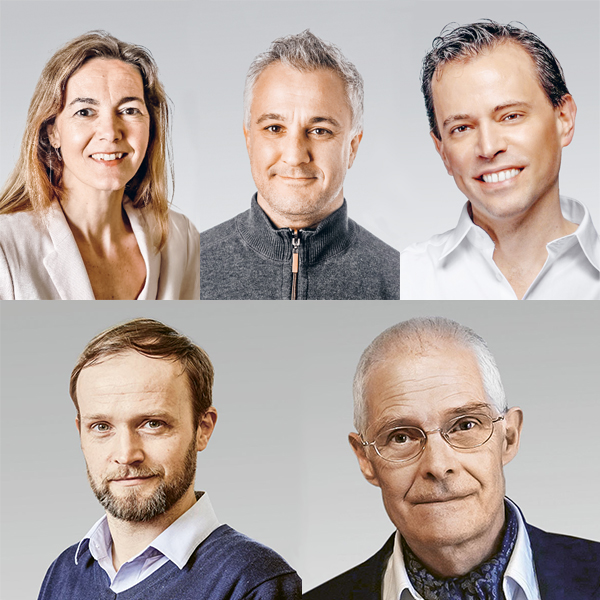Reproduction
Discrimination is rife in the fertility market
The ease with which someone can access reproductive technology depends on whether they conform to social norms. And, naturally, on whether they have money. We look at the injustices in a thriving market.

Having a baby through artificial insemination can be a discriminatory process. | Photo: Iacopo Pasqui / Connected Archives
Sperm quality is declining – and more and more women are getting pregnant later in life. As a result, the age-related risk of infertility is also rising. This is why, in Switzerland, some 6,000 to 7,000 couples seek medical help every year.
The measures they utilise include the hormonal stimulation of ovulation, freezing their sperm and eggs, artificial insemination (in which sperm is placed in close proximity to the fallopian tubes) and in vitro fertilisation methods (IVF), the most common form being intracytoplasmic sperm injection involving a single sperm being placed directly into an egg.
In Switzerland alone, some 30 fertility clinics are currently offering assorted reproductive technologies. The numbers worldwide rise into the thousands. “Our desire to have a child has become a thriving market”, says Carolin Schurr, a professor of social and cultural geography at the University of Bern. “Transnational consortia exist today that earn a lot of money with sperm, egg cells, IVF and reproductive genetic technologies”. Depending on the statistics you use, the global fertility market could reach a market volume of USD 40 to 80 billion by 2030.
No altruism in donating eggs
In comparison to other European countries, reproductive medicine is strictly regulated in Switzerland. Surrogacy is prohibited, as is egg donation. This is why, in 2019, 516 Swiss-based couples or individuals travelled abroad for reproductive technology.
These figures come from a study that Schurr’s group conducted in collaboration with the Interdisciplinary Centre for Gender Studies (ICFG) at the University of Bern. They are only approximate, and the study’s authors assume that reproductive tourism is significantly higher still. In 82 percent of cases, the reason for going abroad was egg donation, and to this end most people went to Spain, which is considered Europe’s leading destination for this practice.
Schurr is critical of the fact that the public debate about egg donation is dominated by the perspective of those wanting children. This is why her research group is interested in the experiences of donors and has interviewed 30 of them in Spain. “It’s a fallacy that people donate eggs out of altruism”, says Schurr. “Women almost always do it for economic reasons”. Their respondents included women suffering from poverty, and middle-class women who used the proceeds to finance their studies or to support a family member in need.
In Spain, egg donors don’t get any kind of ‘salary’, just a one-off compensation sum of roughly EUR 1,000 per egg donation. “Some have had eggs extracted up to 20 times”, says Schurr. “For them, it was simply a job”. But it’s an extremely risky one. According to the Swiss Federal Office of Public Health, donating eggs can lead to infertility, psychosocial stress, or even life-threatening ovarian hyperstimulation syndrome.
According to Schurr, the concept of ‘donation’ is also a result of gender stereotyping that suggests women perform reproductive services out of love. “Doctors and laboratory technicians earn from it. Why not the women who’re actually giving their eggs?” Many feminists today reject egg donation categorically, arguing that it’s exploiting women from Southern and Eastern Europe and the Global South who are in a precarious position – and all because the rich want babies. A debate is also taking place in Switzerland about what a ‘fair’ process of egg donation might look like, and the federal government has meanwhile responded to the increasing demand. In late January 2025, it decided on the parameters necessary to approve the procedure as of 2026.
Asylum seekers can’t afford the pill
Social scientists have long been interested in questions of justice surrounding childbearing, contraception and abortion. To them, these are all facets of a single, complex issue. In the 1990s, African-American women activists in the United States developed the concept of ‘reproductive justice’. They argued that it was also socio-economic factors and access to resources that gave women the freedom to make decisions about their own bodies and about whether or not to have a child.
Schurr’s current research also refers to this. She’s leading a team of eight researchers who are investigating how reproduction is being controlled for specifically political purposes: what population groups are being encouraged to reproduce, and who is being prevented from having babies.
Inequalities of this kind are revealed in exemplary fashion in a sub-project being run by Milena Wegelin, a social anthropologist from the Bern University of Applied Sciences. She and her colleague Laura Perler are together researching into the situation of pregnant women in asylum centres. To this end, she has conducted interviews with Arabic-speaking women in the canton of Bern. Despite initially wanting children, many of them decide against pregnancy after having arrived at their asylum centres. “The situation for pregnant women is especially precarious in the federal asylum centres”, she says. “Many of them eat too little because they are unable to cater for their shifting nutritional needs during pregnancy by cooking for themselves”.
What’s more, in some places there is a lack of beds for those women who’ve just given birth, and there are too few rooms for breastfeeding. “At the same time, it’s also difficult for these women to avoid pregnancy because they often have no access to contraception”. Social welfare payments are insufficient for them to afford the pill, for example. These asylum seekers are thus faced with a paradoxical situation: they can become pregnant unintentionally in their collective accommodation, but at the same time they are denied the opportunity to undergo a pregnancy under appropriate conditions. And all the while, Swiss women are spending lots of money to go abroad to fulfil their desire for a child.
Nicole Bourbonnais is Canadian historian who is conducting research at the Geneva Graduate Institute and published a book in spring 2025 on reproductive politics in the 20th century. She explains that injustice in matters of reproduction is something with a long history. “In the early 20th century, eugenics promoted forced sterilisation in a number of countries, as did programmes for population control that were instituted decades later”, she says.
Cases of forced sterilisation occur to this day, says Bourbonnais, with the targets mostly being marginalised groups, ethnic minorities, people in poverty or those with disabilities. “Dominant groups in society are often encouraged to reproduce, while minorities are either subjected to pressure to prevent them from reproducing or are deliberately prevented from doing so”, says Bourbonnais. Until 2017, this also applied to transgender people in Switzerland. Biological women undergoing gender reassignment also had to undergo sterilisation for their new gender to be recognised officially.
Switzerland ranks lowest in Europe
“At all costs, society wanted to prevent the possible emergence of either pregnant men or women who could impregnate others”, says Tanja Krones – the head physician for clinical ethics at the University Hospital of Zurich. What’s more, the majority of society blindly assumed that transgender people didn’t want children. “These forced sterilisations meant that an entire generation never had the opportunity to reproduce”, says Krones. It was only a ruling by the European Court of Human Rights in 2017 that brought about the abolition of forced sterilisations in Switzerland.
Krones is currently the co-director of the research focus area ‘Human Reproduction Reloaded’ at the University of Zurich. Their prime interest is in medical technologies for human reproduction and their sociological, ethical and legal implications. An interest group for transgender and gender diversity was also founded there in 2024 to pool research in this field. The knowledge thereby gained will later be incorporated into training programmes for doctors.
Switzerland still has a lot of catching up to do when it comes to reproductive justice, says Krones. For example, the World Health Organization has declared that “[f]ailure to become pregnant after 12 months of regular, unprotected sexual intercourse is defined as infertility”, and so it recommends that countries should treat in vitro fertilisation as an aspect of reproductive health. Many European countries already cover the cost of IVF in full, including France, Belgium, Sweden and Denmark. They usually also do this for lesbian couples and single women. But not Switzerland. This is unfair, says Krones: “The question inevitably arises: Who can actually afford to have children in Switzerland?” There’s no doubt about it: research has proven that the global reproductive market is anything but fair.



